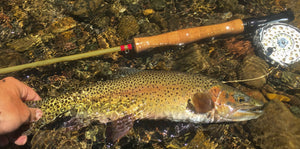Access is Everything
If you don’t know about Backcountry Hunters and Anglers (BHA), you’ve been running in the wrong circles. It’s okay. We got you. We consider BHA the preeminent group of smart, motivated people working to ensure we have exceptional fishing (and hunting) opportunities for generations to come.
Though this group is sometimes pigeonholed as a hunting conservation organization, they do a lot of advocacy work for fisheries and anglers too. I mean, it’s right there in the name. Backcountry Hunters and Anglers.
Though a international organization (they’re in Canada), local chapters at state and county levels make up the backbone of BHA. Those local volunteers identify issues of concern to anglers and raise their collective voices to ensure their perspectives are heard and recognized. Those local chapters gather regularly—sometimes to rally collective action for or against legislation that affects outdoor recreation, sometimes to hold volunteer events like river clean ups or habitat restoration projects, sometimes to just BS about fishing (and hunting) and maybe have a beverage or two.
These are our people. They realize that, in order for fishing to survive into the 22nd century, we need leverage our numbers and make sure that the culture of angling is heard and represented.
Our fisheries need logical, science-based management policies that balance the needs of many complex stakeholders who depend on our rivers, streams, lakes, and oceans. BHA works to amplify the voices of anglers when it comes to policy and management decision making, both at the national and local levels.

BHA North American Action Map
Perhaps most importantly, however, BHA works to maintain and expand public access to land and water. Water access is increasingly problematic in the United States. Just look at the recent supreme court decision in New Mexico, where hundreds of miles of streambed were restored to the public trust. Or if you’re in the mood to get pissed off, have a look at last year’s supreme court decision in Utah, where the opposite happened, and access to hundreds of miles of prime fishing water was taken away.
Water access laws are complicated. Some states, like Montana, consider the vast majority of rivers and streams to be held in the public trust. Anglers therefore can go just about anywhere they want so long as they access the water legally and stay below the high water mark. Other states, like Arizona, take a very different approach. In Arizona, the only river that’s considered public water is the Colorado River. All other rivers and streams are private. Unless you own land, you can’t fish there.
Every state has a different set of rules for where anglers can and can’t go. A few years ago BHA published a guide overviewing the rules on stream access across all 50 states. I recommend you save that for the next time you take a fishing trip to a neighboring state. BHA also fights hard to expand and protect our access to water and fisheries. Without access, our fishing culture shrivels. No offense to the British, but unless we all want to turn into highly technical carp addicts baiting our swims and threading our boilies onto hair-rigs, we’d be smart to keep an eye on our fishing access rights.
We’re proud BHA supporters, and we hope you will consider supporting them as well. Sure, a donation would be appreciated, but better yet, join your local chapter. Show up to a meeting or two. Find out how you can get involved with protecting and improving your local fisheries. If nothing else, it’s usually a good excuse to drink a beer, meet a few new friends, and lie about your most recent fishing trip.
Learn More: Backcountry Hunters & Anglers


